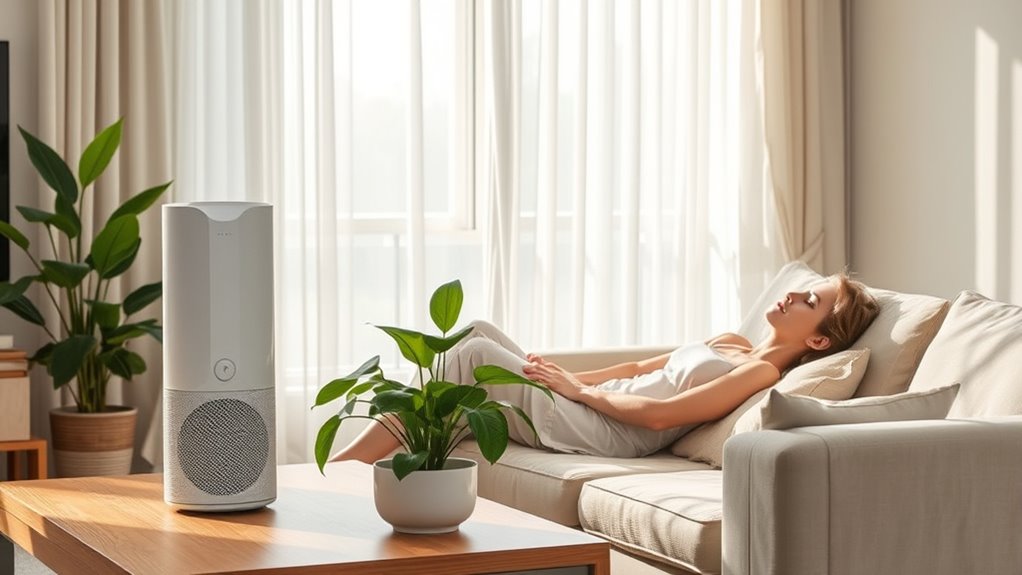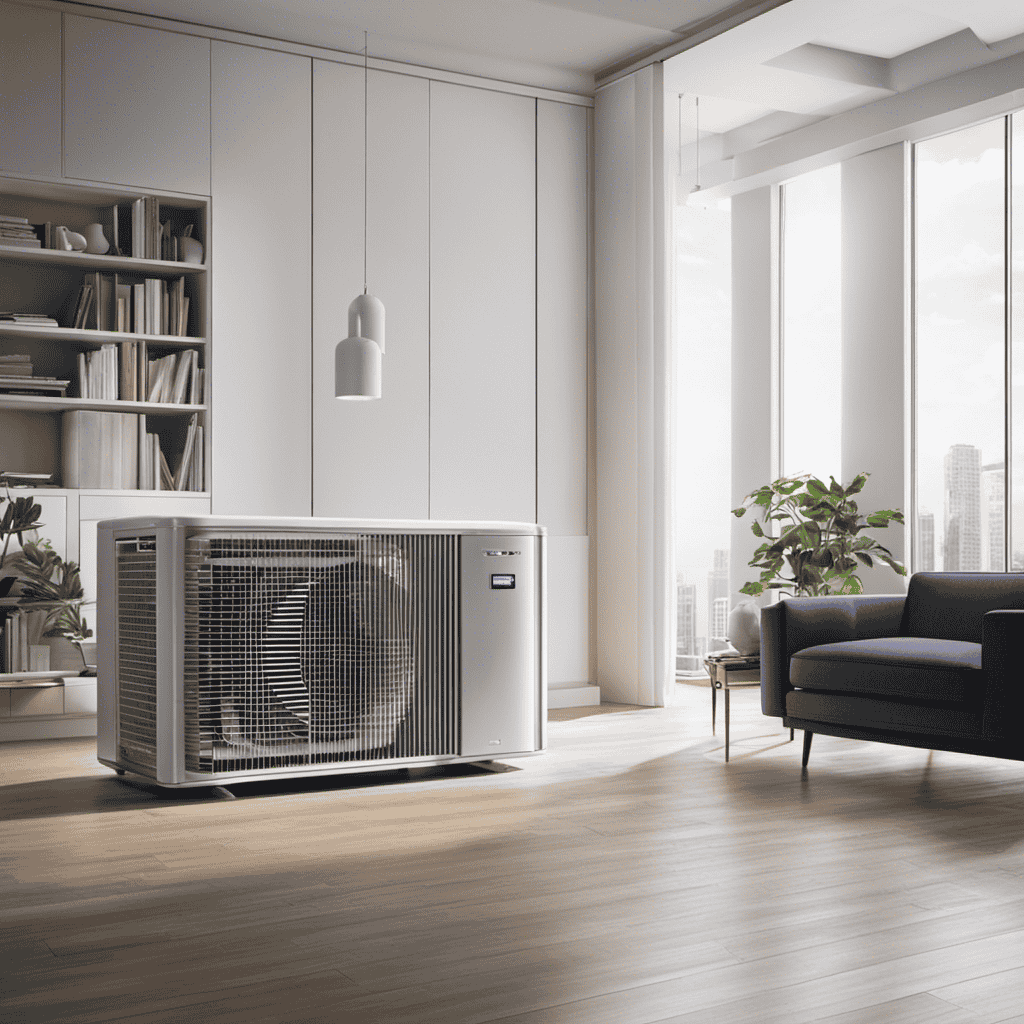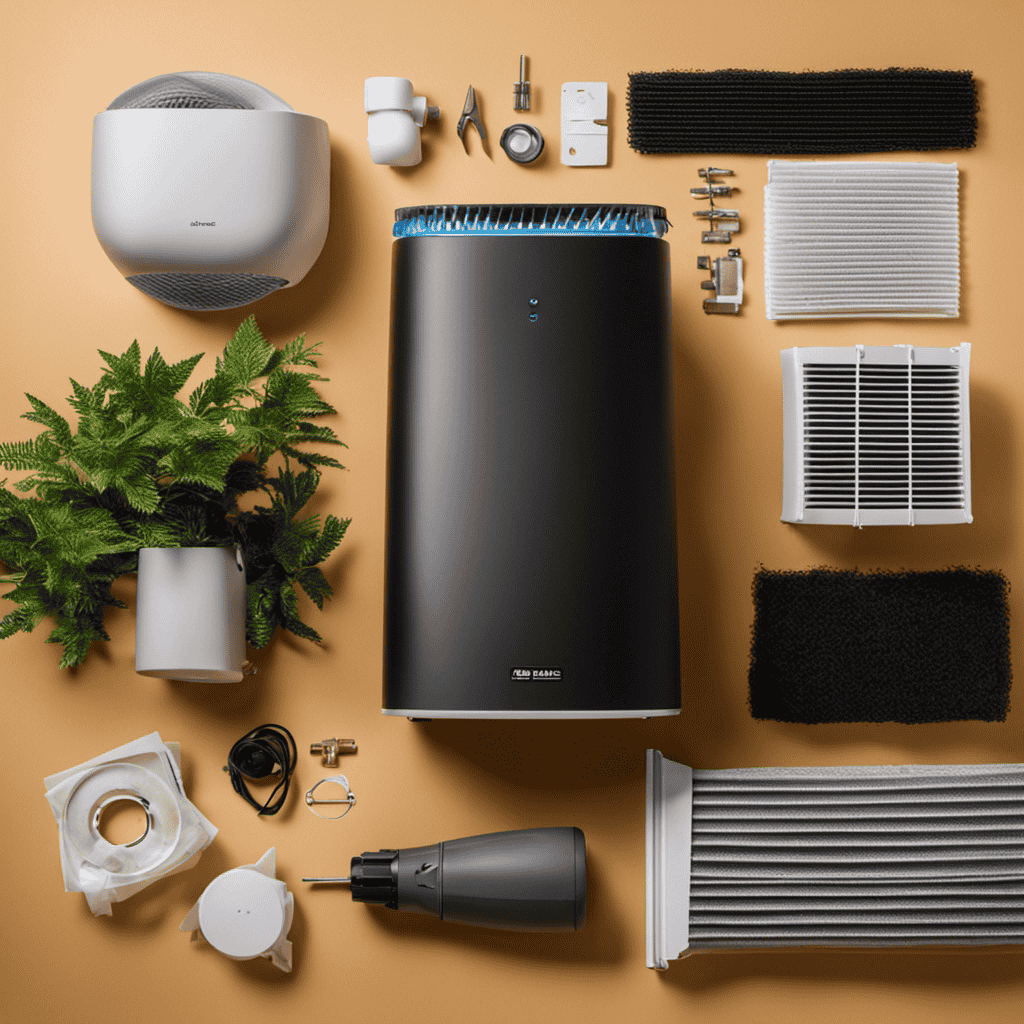Cleaner indoor air can substantially boost your mental well-being by reducing harmful pollutants that impair brain function and trigger mood issues. Using air purifiers helps remove particles and chemicals linked to inflammation and emotional instability, leading to clearer thinking, better mood, and lower stress levels. Improved air quality supports restful sleep and emotional resilience. If you want to discover simple ways to enhance your mental health through better air, keep exploring how clean indoor environments can make a difference.
Key Takeaways
- Cleaner indoor air reduces brain inflammation caused by pollutants, supporting better neural function and emotional regulation.
- Using air purifiers decreases mental fatigue and irritability by filtering harmful particles that impair cognitive performance.
- Improved air quality enhances sleep quality, leading to better memory, focus, and overall mental resilience.
- Reduced exposure to airborne toxins lowers anxiety and depression, promoting emotional stability and psychological well-being.
- Combining air purifiers with indoor plants and ventilation optimizes mental health benefits through a cleaner, healthier environment.
The Link Between Air Quality and Mental Clarity
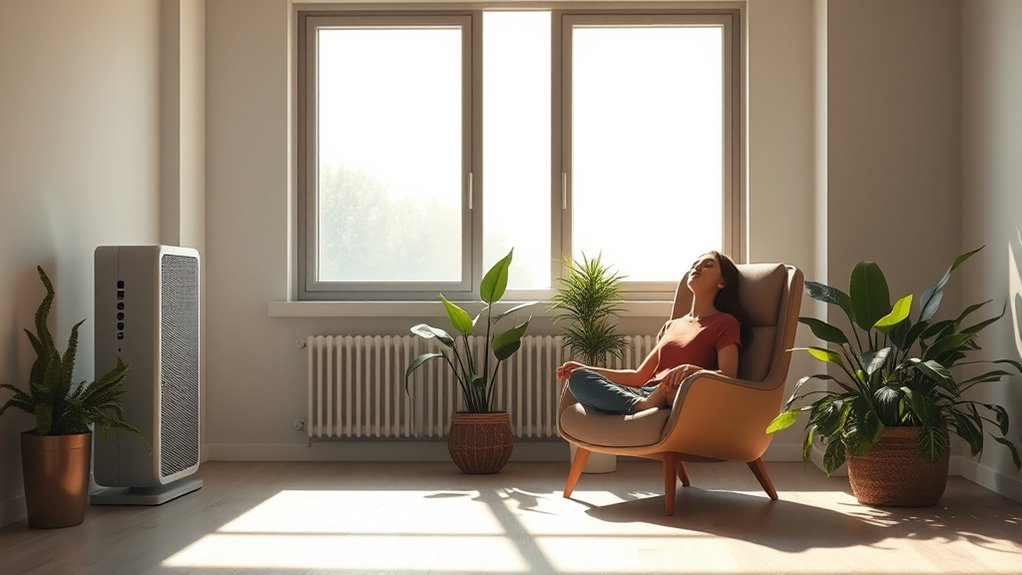
Poor air quality can profoundly impair your mental clarity, making it harder to concentrate, think clearly, or stay alert. Air pollution introduces harmful particles and chemicals into your environment, which can disrupt brain function and reduce your ability to focus. When the air is polluted, your brain works harder to filter out irritants, draining mental energy and causing fatigue. Over time, exposure to high levels of air pollution might lead to decreased cognitive performance and difficulty maintaining attention. Clean air helps support optimal brain activity, allowing you to think more sharply and stay engaged. Improving your indoor air quality through HEPA filters and purifiers can greatly enhance mental clarity, helping you stay productive, alert, and focused throughout your day. Using air purifiers with advanced filtration technologies like HEPA filters ensures that airborne pollutants are effectively removed, further supporting cognitive health. Recognizing the importance of air quality can motivate you to create a healthier environment for your mental well-being.
How Pollutants Affect Brain Function and Mood
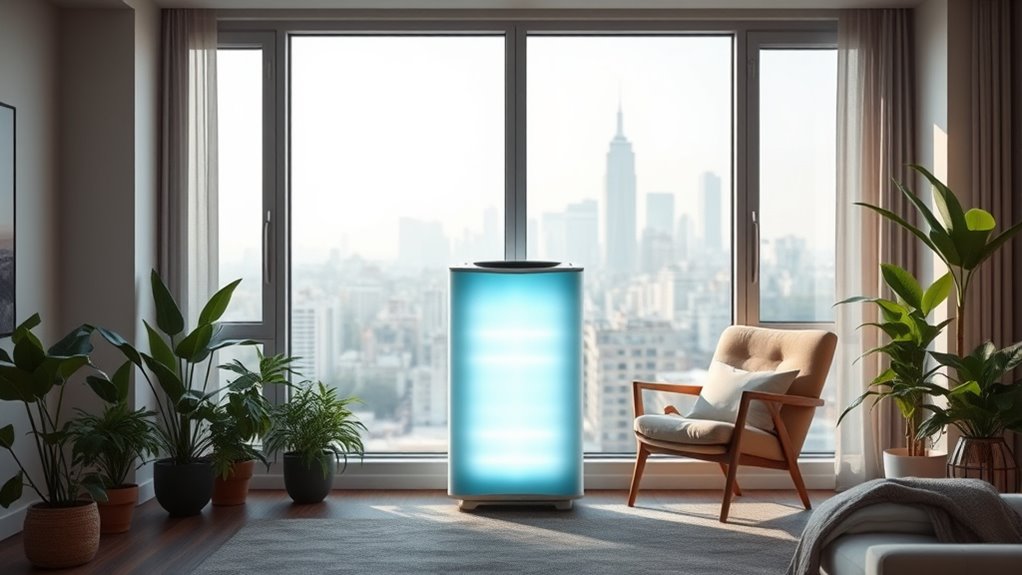
Air pollutants don’t just impair your mental clarity—they directly influence how your brain functions and moods fluctuate. When exposed to pollutants, your brain can experience inflammation, which hampers normal processes. This inflammation can lead to neurotransmitter imbalance, affecting mood regulation and cognitive performance. To understand this better, consider:
- Increased brain inflammation disrupts neural communication.
- Neurotransmitter imbalance can cause anxiety, depression, or irritability.
- Chronic exposure worsens these effects, impacting overall mental health.
- Implementing aesthetic home decor solutions like air purifiers may also contribute to creating a healthier indoor environment that supports mental well-being.
Pollutants like particulate matter and chemicals penetrate the blood-brain barrier, triggering inflammation and altering neurotransmitter levels. These changes can make you feel more anxious, less focused, or emotionally unstable. Reducing exposure, such as using air purifiers, may help protect your brain from these harmful effects and promote brain health and resilience.
The Science Behind Air Purifiers and Cognitive Health
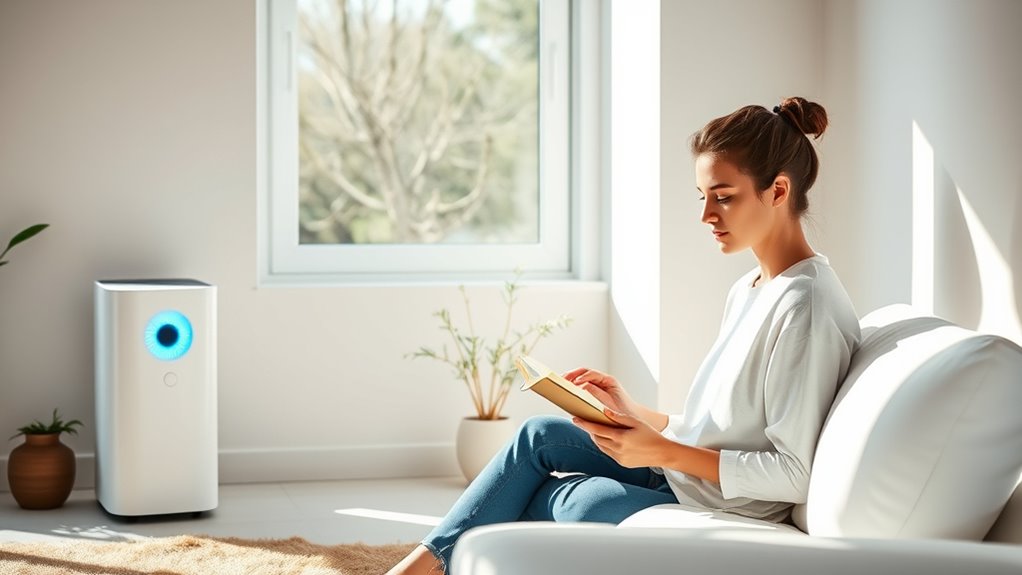
Understanding how air purifiers support cognitive health requires examining their role in removing harmful particles from your environment. By filtering out pollutants like particulate matter and volatile organic compounds, they help reduce neuroinflammation, which is linked to cognitive decline and mood disorders. Less neuroinflammation means your brain experiences less stress and inflammation, supporting clearer thinking and better emotional regulation. Additionally, cleaner air can improve sleep quality, as reduced exposure to airborne irritants leads to fewer breathing disruptions and a more restful night. Better sleep enhances memory, concentration, and overall mental resilience. Furthermore, the use of essential oils in conjunction with air purifiers can amplify these benefits by providing aromatherapeutic support for relaxation and mental clarity. In fundamental terms, air purifiers create a healthier internal environment, directly supporting your brain’s function and well-being through the combined effects of neuroinflammation reduction and sleep quality enhancement. Incorporating air quality monitoring can further optimize these benefits by ensuring consistent indoor air quality, which also helps prevent skin irritation caused by airborne pollutants.
Evidence Supporting Mental Health Benefits of Clean Indoor Air
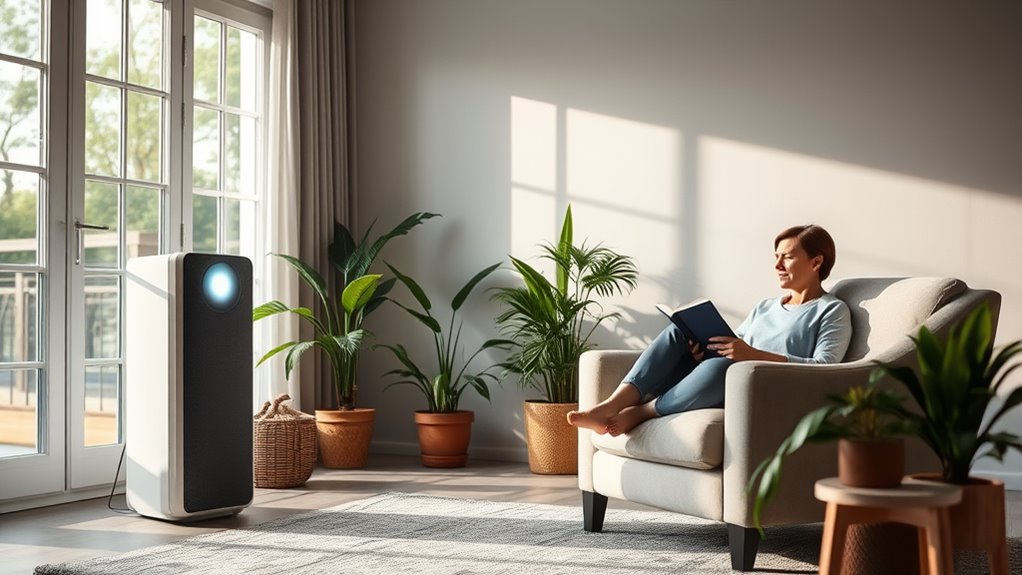
Research shows that reducing airborne pollutants can directly improve your mental well-being. When indoor air is cleaner, your body experiences less respiratory stress, helping you feel calmer and more focused. Better air quality also supports enhanced cognitive function, making it easier to concentrate and think clearly. Additionally, incorporating air purification systems can further enhance indoor air quality and promote overall mental health.
Reduced Airborne Pollutants
Reducing airborne pollutants can considerably improve indoor air quality, which in turn supports better mental health. When airborne toxins decrease, you may notice a reduction in mental fatigue and improved focus. Air purifiers help remove common pollutants like volatile organic compounds (VOCs), dust, and pet dander, all of which can contribute to cognitive strain. Here are three key benefits: 1. Fewer airborne toxins lead to less mental fatigue, making it easier to concentrate. 2. Clearer air reduces irritability and enhances mood stability. 3. Improved air quality can decrease anxiety linked to indoor pollution exposure. Additionally, implementing air purifier technology can help monitor and maintain optimal air quality levels more effectively. Incorporating air quality monitoring systems can further optimize the benefits by providing real-time data and alerts. Understanding the importance of cultural narratives promoted through environment-friendly practices can also motivate healthier lifestyle choices. Moreover, the integration of climate control systems, such as heat pumps, can enhance overall indoor environment quality by regulating temperature and humidity, further supporting mental well-being.
Lowered Respiratory Stress
Lowering airborne pollutants not only improves mental clarity but also particularly reduces respiratory stress, which can directly impact your overall well-being. Dust accumulation often worsens allergy triggers, leading to congestion, coughing, and breathing difficulties. These symptoms increase physical discomfort and can elevate anxiety levels, affecting your mental health. By using air purifiers, you can minimize dust and other irritants, creating a cleaner indoor environment. This reduction in respiratory stress helps you breathe more easily and comfortably, decreasing the physical and emotional strain associated with allergies. Improved air quality means fewer interruptions to your daily routine caused by respiratory discomfort. As a result, you’re likely to experience less stress, better sleep, and a more stable mood, supporting your overall mental health and well-being. Regular maintenance of appliances like air purifiers ensures they function optimally and continue to provide these benefits preventive maintenance. Incorporating air quality improvements into your routine can further enhance your mental health benefits.
Enhanced Cognitive Function
Clean indoor air can considerably boost your cognitive function, allowing you to think more clearly and concentrate better throughout the day. Studies reveal neuroplasticity insights showing that improved air quality enhances brain flexibility, making cognitive training more effective. When pollutants decrease, your brain can better process information and form new neural connections. This means sharper memory, quicker decision-making, and improved problem-solving skills. To maximize these benefits, focus on three key points:
- Reduced airborne toxins support brain health.
- Cleaner air may accelerate neuroplasticity, enhancing learning.
- Better cognitive function leads to improved mental resilience. Additionally, sustainable materials used in air purifiers can further promote overall health and environmental well-being. Investing in air purifiers creates an environment that fosters these cognitive benefits, ultimately helping you perform at your best daily. Enhanced air quality can also contribute to better sleep quality, further supporting mental clarity and overall well-being.
Practical Ways to Improve Indoor Air Quality for Well-Being
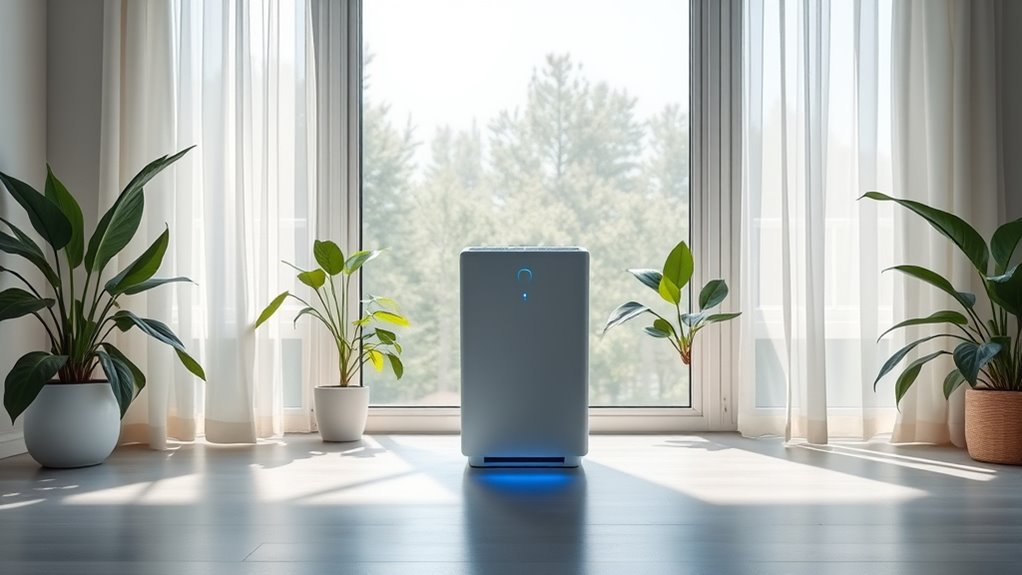
Improving indoor air quality is essential for supporting your mental well-being, especially since you spend a significant amount of time indoors. Start by using air quality monitoring devices to identify pollutants and track improvements. This helps you take targeted actions for better air. Incorporate indoor plants, which offer natural benefits like filtering toxins and increasing humidity, enhancing overall air quality. Regularly ventilate your space by opening windows to let fresh air in, especially after activities like cooking or cleaning. Keep your home clean to reduce dust and allergens, and consider using air purifiers with HEPA filters for extra protection. These practical steps create a healthier environment, which can positively influence your mental clarity and emotional stability over time. Additionally, understanding the different types of performance cookies used on websites can help you make informed choices about your online privacy while researching air quality solutions. Maintaining your air purifier regularly, such as filter replacement, ensures it functions effectively and continues to improve your indoor environment. Regular maintenance also helps prevent issues like reduced airflow and prolongs the lifespan of your device, ensuring consistent air quality improvements.
Psychological Effects of Breathing Cleaner Air
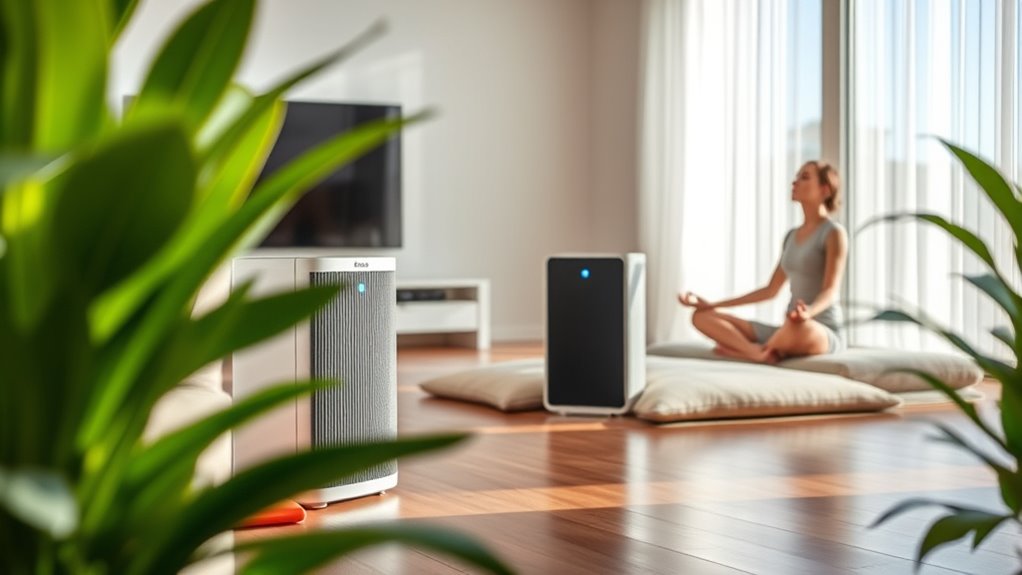
Breathing cleaner air can considerably boost your mental health by reducing stress and enhancing focus. When air pollution levels decrease indoors, you often experience clearer thinking and improved mood. Cleaner air supports your mental resilience, helping you better cope with daily challenges. To maximize these benefits, consider these key points:
- Reduced exposure to air pollution lowers anxiety and depressive symptoms.
- Improved air quality enhances your ability to concentrate and make decisions.
- Consistently breathing clean air can foster a sense of calm and overall well-being. Incorporating air quality improvements into your environment can also promote better sleep and emotional stability.
- Regular maintenance and timely filter replacements, as recommended for different air purifier brands, ensure ongoing air quality improvements filter maintenance.
- Incorporating air purifiers equipped with advanced filtration technologies can further enhance indoor air quality and support mental health.
Limitations and Considerations When Using Air Purifiers
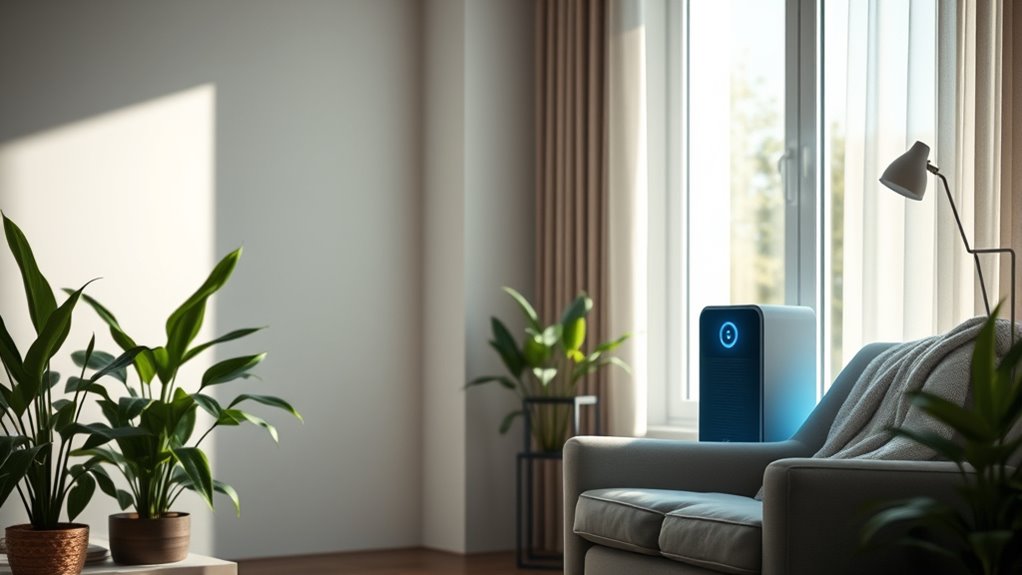
While air purifiers can considerably enhance indoor air quality, they also come with limitations you should consider. One major factor is cost and accessibility; quality units can be expensive, making them less accessible for some households. Additionally, ongoing expenses for replacement filters and energy use add to the overall cost. Maintenance challenges also pose a concern. Air purifiers require regular cleaning and filter changes to operate effectively, which can be time-consuming and overlooked. Poor maintenance reduces their efficiency, limiting health benefits. Before investing, weigh these considerations against potential mental health improvements. Understanding these limitations helps you make informed decisions about integrating air purifiers into your space, ensuring you get the most benefit without unexpected burdens. Risk assessment for merchant services can help evaluate the potential drawbacks and ensure the investment aligns with your health and financial priorities.
Future Research Directions on Air Quality and Mental Well-Being
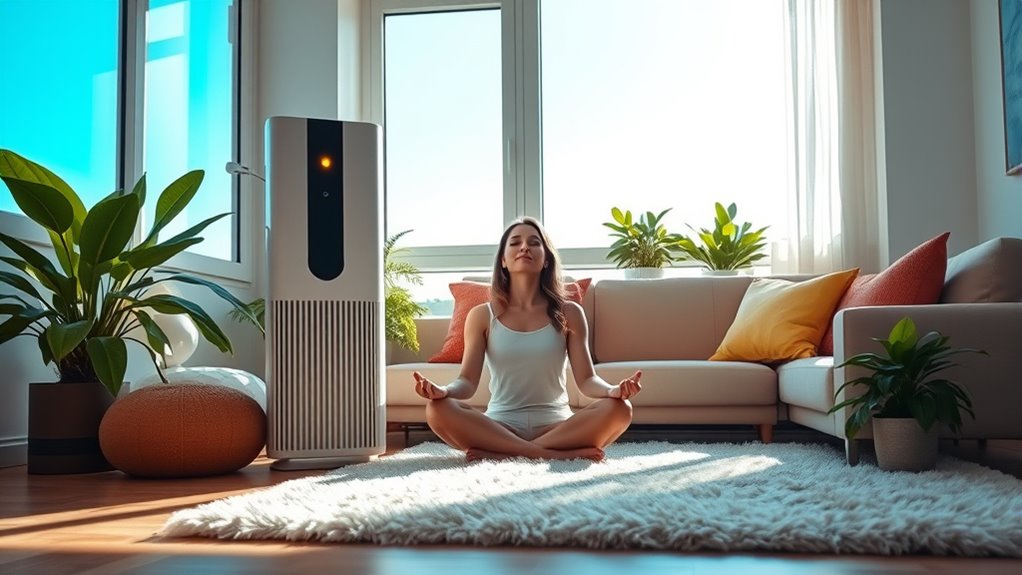
As research progresses, understanding the connection between air quality and mental well-being is becoming increasingly important. Future studies should focus on harnessing technological innovations to better measure indoor and outdoor air pollutants’ effects on mental health. You might explore how new air purification technologies can be optimized for psychological benefits. Additionally, research could inform policy implications, guiding regulations that improve air quality standards with mental health outcomes in mind. Consider these key directions:
- Developing advanced sensors to track real-time air quality and mental health correlations.
- Investigating long-term effects of reduced pollution on mental well-being.
- Shaping policies that promote healthier environments through innovative air management solutions.
These efforts will help create targeted strategies for improving mental health through cleaner air.
Frequently Asked Questions
How Quickly Can Air Purifiers Impact Mental Health Symptoms?
When you ask how quickly air purifiers impact mental health symptoms, it depends on your air quality. If you improve indoor air quality with an air purifier, you might notice clearer breathing and reduced allergens within hours or days. These improvements can lead to better sleep and mood over time. While individual results vary, cleaner air can gradually enhance your mental health by creating a healthier environment.
Are There Specific Pollutants More Harmful to Mental Well-Being?
You should know that indoor allergens and airborne toxins can considerably harm your mental well-being. These pollutants may cause stress, anxiety, or cognitive difficulties. Exposure to mold spores, pet dander, or volatile organic compounds (VOCs) often worsens mental health symptoms. Using an air purifier helps reduce these harmful pollutants, so you can breathe easier, and potentially improve your mood and mental clarity over time.
Can Air Purifiers Replace Other Mental Health Interventions?
You might think air purifiers alone can replace mental health treatments, but they’re best seen as complementary therapies. They improve air quality, which supports your overall well-being, yet lifestyle changes like exercise and therapy are essential for meaningful mental health improvements. Relying solely on air purifiers overlooks the complex nature of mental health. Use them as part of a holistic approach, not a substitute for professional interventions.
What Are the Potential Risks of Using Air Purifiers Improperly?
When using air purifiers improperly, you risk issues like reduced effectiveness and potential health problems. If you don’t perform regular filter maintenance, the purifier can circulate dust and allergens instead of removing them, increasing allergy triggers. Additionally, neglecting filter changes may lead to mold growth or malfunctions. To stay safe, follow manufacturer instructions, keep filters clean, and monitor air quality, ensuring your purifier benefits your well-being rather than causing unintended harm.
Do Different Types of Air Purifiers Vary in Mental Health Benefits?
You might wonder if different filter types and noise levels affect mental health benefits. You’ll find that HEPA filters are highly effective at removing allergens, while activated carbon filters target odors, potentially improving mood. Lower noise levels from quieter purifiers can help you relax and focus, enhancing well-being. Choosing a purifier with the right filter type and minimal noise guarantees you get the mental health boost you’re seeking.
Conclusion
Just as a clear sky lifts your spirits, cleaner indoor air can boost your mental well-being. By embracing better air quality, you’re nurturing your mind’s clarity and resilience, much like planting seeds in fertile soil. Don’t forget, even Socrates sought clarity in thought—so take steps to improve your environment. Remember, the air you breathe shapes your mind’s landscape—choose purity, and let your mental health flourish like a well-tended garden.
